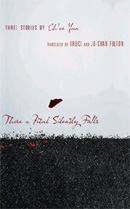
This collection of short works carries a title that is gentle and lyrical. Petals are delicate and beautiful and soft to the touch. They are silent when they fall.
Of the three stories in the book, the last two, "Whisper Yet" and "The Thirteen-Scent Flower" are fascinating examples of modern Korean literature in their own right. One deals with that which we most associate with Korea: A land divided both geographically and ideologically, and the curious bonds that can emerge between inhabitants of each side, while the final story is a smashing piece of wry observation and skilful commentary on contemporary South Korean society.
But the title story, the first in this collection and the longest, is the one that grabs the attention with horror and despair, and it is a story that will stay with me for quite a while.
In May 1980 martial law was declared by South Korean military leaders trying to quell a growing demand by the people for democracy. A popular uprising in Kwangju was brutally crushed by state paratroopers, and many innocent and defenceless citizens were murdered.
This tragic event has a great bearing on the story, yet we never learn of it directly. Instead, in a stunning multi‒voiced narrative reminiscent of Rashömon, we hear the story in snatches, like pieces of a puzzle. This gruesome sketch is provided by three voices: the first‒person narrative of a traumatised girl, who has fled the massacre after witnessing her mother's death and now ghosts through the countryside in a kind of post-apocalyptic stupor; a third-person narrative from the viewpoint of an inarticulate and poor construction worker, who finds the girl out wandering, rapes her and then takes her in; and a plural narrative related by a group of college students who are retracing the girl's steps in an effort to locate her. These three voices repeat themselves throughout the book, the narratives are cyclical, the style and the perspective changing constantly, so that the chaotic events being described can never be entirely understood, but the chaotic telling reflects enough. That said, while the structure is very clever, it is the emotion contained in the story that really makes it such a fine piece of writing. Because of its brutality, it is not an easy read, but its lyrical treatment of a cruel world will greatly reward—and haunt—every reader.
And so, returning to the title, we find loss and desperation instead of beauty. We find violence and pain instead
of gentleness. We find harshness and rawness instead of delicacy. And we learn that the petal of the title
merely represents a destroyed girl in a blood‒spattered skirt. After surviving the massacre, she is
repeatedly raped and mistreated, ripped apart and trodden underfoot - just like a crushed blossom. Only the
lyricism remains.

Columbia Univ. Press, hardcover, 9780231142960